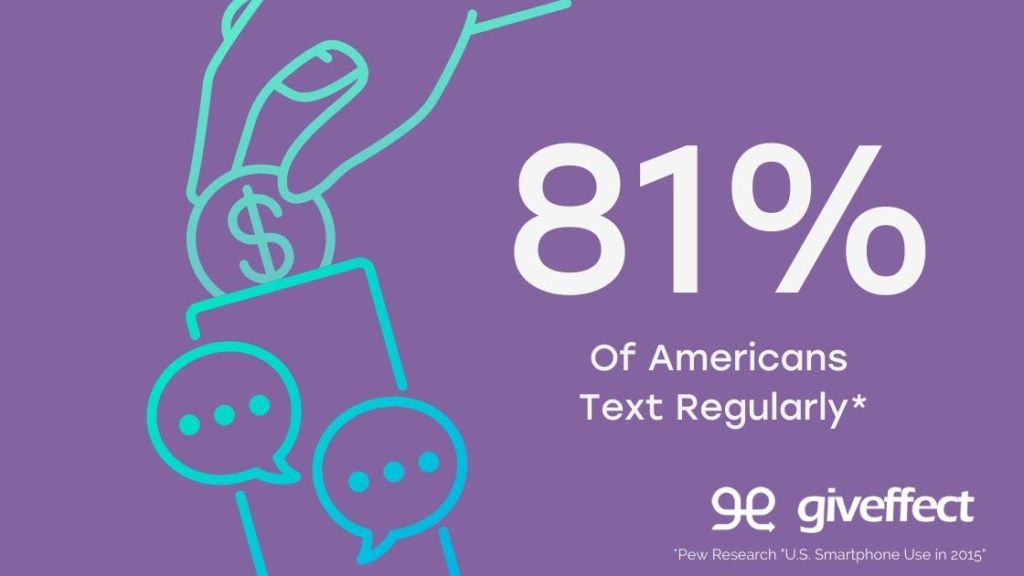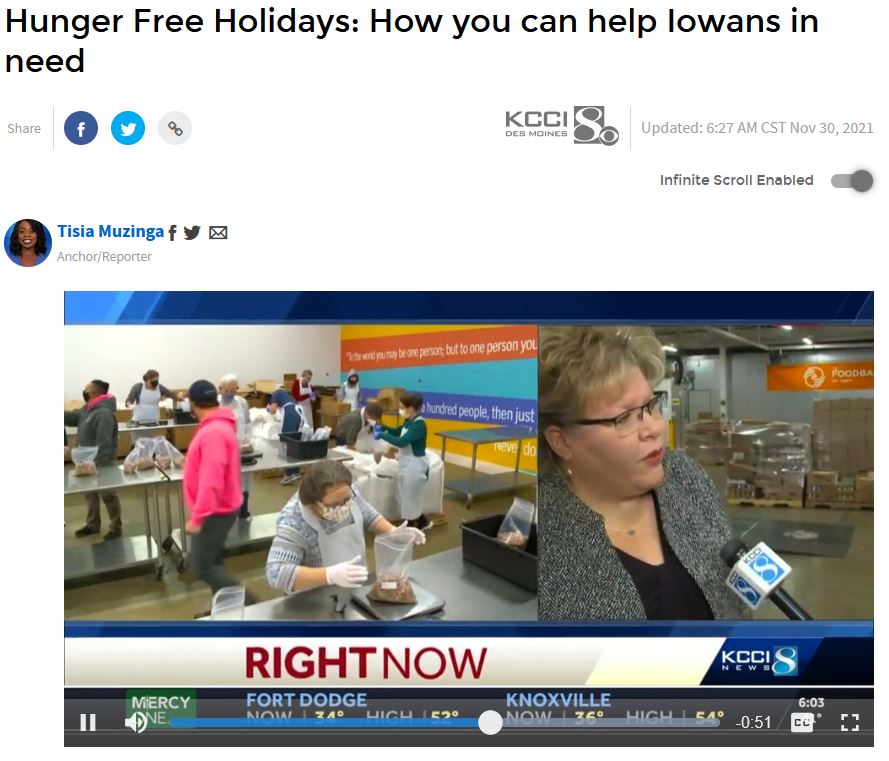Are you leveraging Text-to-Give in your fundraising strategy? Almost everyone has a mobile device, and we use them for almost every aspect of our lives, particularly texting. According to this study, over 6 billion texts are sent every day, and 81 percent of Americans text regularly.

In this article, we will take a look at:
- What is text-to-give fundraising?
- How well does text-to-give fundraising work?
- Text-to-give fundraising benefits
- Text-to-Give campaign examples
- Text-to-Give fundraising with Giveffect
1. What is text-to-give fundraising?
Text-to-give fundraising uses text messages, also called SMS (short message service), to fundraise for a cause. The giving usually works like most fundraisers with an ask and an implementation to gather donations, but depending on your campaign they can vary.
For example, you simply send a short direct text message out to your constituents with a link to give. An ask could look something like this:
“Over xx percent of people in your neighborhood are hungry. Give today to your local Food Bank to help: <link>”
You can also use a keyword campaign, in cooperation with other types of media, like radio, television, print, billboards, and online. All someone has to do is use the “keyword” with a short number to trigger the next action. An ask might look something like this on a billboard or advertisement:
“Animals are in need and need your help. Text ‘RESCUE’ to 1234 to give.”
And when someone texts that keyword, it will trigger one of several responses depending on the campaign. It could trigger a second text with instructions and links to a fundraising webpage. Or it could ask for permission for an automated donation to accept payments via text.
2. How well does text-to-give fundraising work?
We know that almost everyone uses text messaging, but does this translate into a fundraising use case? While people are texting more, are people open to text marketing? How responsive are they to text asks? Some studies point to amazing results.
SMS has six to eight times the response rate of email, according to a report by Cellit. They reviewed over 1,000 campaigns by various national retailers and found these surprising results. They also found that programs with deadlines can typically have a 23.3 percent conversion rate.
And in fact, customers seem to prefer text as a way to communicate with a business, 89 percent, according to a Twillo study.
So customers prefer it and respond much more to it. That’s a win/win from a marketing standpoint.
3. Text-to-give fundraising benefits
Beyond the amazing response rate, there are some other large benefits to text-to-give fundraising for a nonprofit. One of the best things about text messaging is that it’s usually much easier to set up than an email or mass mailer.
SMS messages are usually shorter than emails and are often less graphically developed, and can be repurposed from already developed social media artwork and messaging.
There can be some initial setup, but it’s generally minimal, and once a text phone number is set up, you can continue to use it for multiple campaigns.
One great example is the Food Bank of Iowa and how they use one number for their multiple campaigns. Once it was set up, they used the same number for their Giving Tuesday campaign again. Let’s take a closer look at it in the next section.
4. Text-to-give campaign examples
The Food Bank of Iowa held a fantastic Giving Tuesday fundraiser featuring a text-to-give campaign in partnership with their local TV station KCCI, a CBS affiliate out of Des Moines, Iowa.
The TV station hosted an all-day telethon, and part of the fundraiser asked viewers to text “KCCI” to the number that the food bank set up and it would send back a link. It had over 100 text replies.
As a result, the event raised over $2.3 million dollars, beating their goal of $2 million dollars!
And there are many examples of successful text-to-give campaigns. One of the first major examples of text-to-give success was a Red Cross campaign to help Haiti after a massive earthquake. The simplicity of the campaign was a strength, simply text the word “HAITI” to a number, and the donation would be automatically added to your cellphone bill.
That campaign raised over $8 million dollars for relief efforts in Haiti. Even the White House tweeted about the success of the program:
The Pew Internet & American Life Project did the first-ever in-depot study of those who are mobile donors. They found that “Three-quarters of these donors (73 percent) contributed using their phones on the same day they heard about the campaign, and a similar number (76 percent) say that they typically make text message donations without conducting much in-depth research beforehand.”
And beyond that, they shared the information, “43 percent of these donors encouraged their friends or family members to give to the campaign as well.”
5. Text-to-Give Fundraising with Giveffect
Giveffect makes text-to-give fundraising easy. A simple upgrade allows Giveffect users to get their own dedicated text message number. And from there, you can create simple-to-build campaigns that you can easily track.
Simply name the campaign, type in the text for the message, add the link, choose who you want the message to go to, and hit send. Most importantly, Giveffect’s 10-in-one system allows you to connect all your marketing together with a nonprofit CRM. So, it is easy to pick and choose any group in your organization to send them a text message campaign instantly.
To get a demo of how easy it is:

